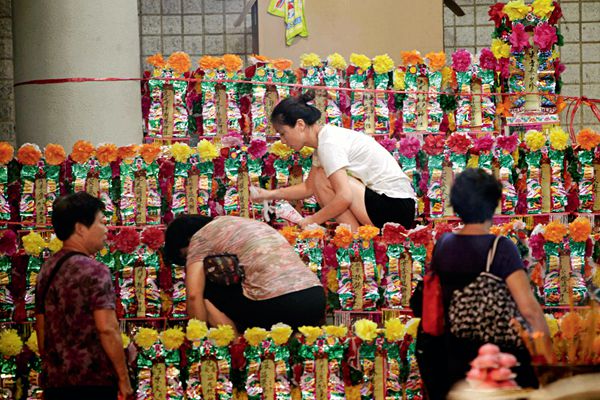Hong Kong's Ullambana Festival: Chinese halloween
 0 Comment(s)
0 Comment(s) Print
Print E-mail China Today, August 9, 2016
E-mail China Today, August 9, 2016
|
|
|
Locals pay respects to the king of ghosts. |
At three pm, the ceremonial procession starts. Taoist priests first chant sutras. There follows a dance performance and the god-inviting rite. Participants sprinkle water along the road to expel bad luck, and some carry lanterns and red balls to lead the way. They invite and include the statues of gods from temples along the way and later return and place them at the altar. The entire procession is to the accompaniment of music and dance to pray for the neighborhood's safety.
Performances are for the amusement of gods as well as local residents, and last for three days from the 15th to the 17th. Originally, only Chaozhou shadow plays were shown, but shows are these days performed by theatrical troupes in praise of ancestors and to entertain the neighborhood.
Rice is dispensed during the ceremony. As Hong Kong's rice industry is mainly run by Chaoshan merchants, these offerings are given on the last day of the festival – not only to believers and the poor, but also to add blessings to ancestors. Daily necessities such as noodles and umbrellas are also distributed.
In addition to chanting sutras, there is also a Taoist rite to release souls from torment. Taoist priests scatter flowers to release wronged or troubled spirits, in hopes that observing how they bloom and fade will reflect life's peaks and descents and so help the departed to accept their destiny.
The festival encompasses beautiful exhibits, festive lanterns, incense carved with flowers, Buddhist and Taoist activities, as well as performances. It is thus a carnival of Chinese worshipful traditions.






